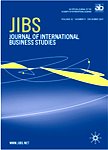-
作者:Wang, Chengqi; Hong, Junjie; Kafouros, Mario; Wright, Mike
作者单位:University of Nottingham; University of International Business & Economics; University of Leeds; Imperial College London
摘要:We explain the mechanisms through which government impacts the internationalization of emerging-market enterprises (EMEs). Rather than merely viewing internationalization as the result of differences in resource positions, we demonstrate that an important source of variation is the idiosyncratic manner in which EMEs are affiliated with government agencies. Although government involvement has a strong effect on international expansion, this effect is contingent upon the level at which the firm ...
-
作者:Galang, Roberto Martin N.
作者单位:Ateneo de Manila University
摘要:Extending research on the institution-based view of international business strategy, this paper posits that the international adoption of technology among firms is distinct from its intra-national counterpart because this process is influenced by the efficiency of the government institutions where each firm is located. Low government efficiency delays investment in unknown technologies by increasing contracting hazards, environmental uncertainty and the difficulty of allocating potential retur...
-
作者:Zhou, Kevin Zheng; Xu, Dean
作者单位:China Europe International Business School; University of Hong Kong
摘要:An ongoing debate in the interfirm exchange literature concerns whether economic and social governance mechanisms function as substitutes or complements. We advance a more nuanced approach to examining how detailed contracts and centralized control interact with relational governance differentially in curbing local supplier opportunism in emerging markets. We suggest that where legal institutions are weak, detailed contracts are ineffective in containing partner opportunism in contractually sp...
-
作者:Mata, Jose; Freitas, Ernesto
作者单位:Universidade Nova de Lisboa
摘要:Received wisdom indicates that, owing to a liability of foreignness, foreign firms exit with greater likelihood than do comparable domestic firms, and that the difference attenuates as firms age and overcome the liability. We posit that foreign firms are also intrinsically more volatile and footloose than domestic ones, and that this leads to an increasing divergence between the exit rates of foreign and domestic firms. Empirically, we find that the difference between exit rates of foreign fir...
